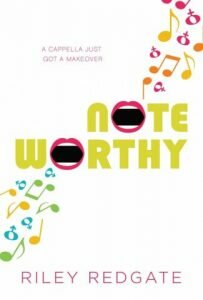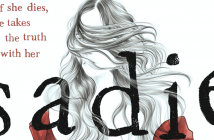 Looking for a new contemporary read? Riley Redgate’s Noteworthy will make your heart sing!
Looking for a new contemporary read? Riley Redgate’s Noteworthy will make your heart sing!
It’s the start of Jordan Sun’s junior year at the Kensington-Blaine Boarding School for the Performing Arts. Unfortunately, she’s an Alto 2, which – in the musical theatre world – is sort of like being a vulture in the wild: She has a spot in the ecosystem, but nobody’s falling over themselves to express their appreciation. So it’s no surprise when she gets shut out of the fall musical for the third year straight. But then the school gets a mass email: A spot has opened up in the Sharpshooters, Kensington’s elite a cappella octet. Worshiped . . . revered . . . all male. Desperate to prove herself, Jordan auditions in her most convincing drag, and it turns out that Jordan Sun, Tenor 1, is exactly what the Sharps are looking for.
Noteworthy is available now. For more on Redgate, visit her or visit her website.
Noteworthy is a novel that feels very right for its time with Jordan’s anxiousness around her intruding into a trans space. Was that something that you set out to write about, or did it develop organically?
The question of crossdressing’s intrusion into the trans space developed organically from the nature of the topic. From the moment I came up with the pitch I’d hoped to explore the question of gender identity. The question was how to approach this exploration, and honestly I’m sure trans readers will have a spread of opinions about whether the anxiousness and awareness of the main character is, I guess, a sufficient treatment. There were a few options: one was to make Jordan ignorant of trans issues, a way to skirt this dialogue entirely; this was unacceptable to me, unrealistic and disingenuous. Second was to have Jordan be a nonbinary/genderfluid/trans character, but a trans awakening story doesn’t feel like mine to write. I want readers to have these sorts of stories from trans authors, stories like Dreadnought or Peter Darling – not from me.
So, the main question I then dealt with was, should one of the main characters be trans? A lack of trans main characters could feel alienating to trans readers, but on the other hand, a trans main character would by nature read as a foil to Jordan, a cis narrator. I really hate marginalized side characters reading like vehicles for development for a non-marginalized main character, where audiences come to see them as a teaching tool or a comparison. (With black representation, this is particularly widespread.) I especially worried about this with this specific project, because the large cast limits the time allotted to developing each character’s relationship with the narrator. A superficial treatment of this element would feel horribly blase given the tone of the novel.
So that’s how the angle developed, this broader and more general anxiety of intruding into trans spaces. As it exists, it’s an exploration of community appropriation – to what degree is crossdressing in daily life appropriative? – with the trans characters at the boarding school known to Jordan by name but not close to her. Not every treatment will work for every story, of course, but however crossdressing stories approach this element, it’s got to be approached.
Do you think that that difference, or at least the awareness of the line being toed, is something other cross-dressing stories could benefit from?
With regard to , , , and those sorts of crossdressing stories: obviously I think they could’ve benefited from more sensitivity toward trans issues, and even toward the actual breakdown of traditional gender roles. To be fair, I’m writing with the benefit of modern social discourse having opened up popular discussion on these issues, so there’s that. specifically is a historical film, and traditional Eastern ideas of gender construction differed from modern-day Western ideas (something I learned from one of my sensitivity readers, actually), so I think it’s tough to transfer the sort of discussion we might expect from contemporary stories.
There was a fair amount of political discourse in the novel. When you were writing it, did you think people would be reading it during a Trump presidency?
When I was drafting the novel, we were still in primary season, so no. (God, no.) It was always going to be a political project, if you consider identity political. If I were writing it now, though, I honestly think I would make it happier. Everybody’s pretty stressed in the book because the school is a real pressure cooker. The pace is slowish and often heavily thoughtful. I’d alleviate that now, I think. More carefree lives. I’d toss happy endings out like candy – more escapism in general.
The subject of money is one that weighed on Jordan throughout the novel, in a way that felt true and authentic. Do you think YA needs more stories that aren’t scared to tackle those tough subjects?
Yeah – with money specifically, I think the real world needs to be more open to discussion, and hopefully that openness would then trickle down into YA. I went to a college where 20% of the kids come from the top 1% of earners in the country. 75% of students come from the top 25% of earners. This is atmospherically palpable in ways that I tried to put into the novel. During my college career, there was quite a bit of talking about talking when it came to these financial dynamics: “why aren’t we talking about this more?” But in the end, the central question seemed to boil down to “What can we even do?” In Noteworthy, I hoped to tackle in equal measure this unspoken discomfort and the problem with silence, this feeling that wealth issues are so structural as to be insurmountable – but also what can actually, concretely make a difference.
Jordan’s journey of self-discovery was beautiful to watch unfold. She wasn’t scared of questioning the world around her, and her place in it, even when it was tough to do sometimes. Was it important for you to portray a character who could be flawed, and recognise those flaws?
We need flawed characters! Oh my goodness. We especially need flawed characters who are marginalized. Not to, you know, harp on about certain things. But one thing you see a lot is marginalized characters, especially marginalized supporting characters, who are given strangely ideal traits as if to compensate for their marginalization. I see the absurdly pretty POC side character a lot, for instance, despite POC having to deal with beauty standards that generally don’t fit nonwhite traits. This needs to be yanked out and reworked from the bottom up.
I mean, in general, characters who are washed out of personality in an attempt for “relatability” simply don’t interest me. I want characters who act selfishly and feel guilt. I want characters who act aggressively and feel regret. I don’t want to siphon out any of the reaches of being a person in order to placate some idea of how I think an audience might react. It’s a disservice to everybody involved.
As an #ownvoices author, how important do you think that movement is in the YA community?
Fiction is vital. Fiction has reach. We all know that, and the realistic inclusion and representation of diverse characters is vital as a result. But the inclusion and representation of diverse authors, editors, and publishing professionals is equally important, so that the fiction being disseminated isn’t a disproportionate display of what certain demographics might prioritize. The demography of the industry can also be self-perpetuating, especially in kidlit, because authors inspire kids to write, and that’s the next generation of writers we’re looking at. And since YA is a largely female space, I don’t want to let it go unsaid that boys, especially POC boys, need male authors to look up to. I mean, you hear Jason Reynolds talking in interviews about how he goes to schools and hears kids say, “I didn’t think authors could look like you.” The success of future diverse authors is contingent on the success of current diverse authors.
Any future projects we can look forward to?
I’m currently working on my 2018 release. It’s about a creative writing student who – galvanized by her teacher, who believes one must suffer to make great art – starts making drastic edits to her real life in the pursuit of writing inspiration. I also have so many potential projects swimming around that I can’t wait to work on next, but I probably shouldn’t speak too extensively on them, or I’ll probably jinx something.





1 Comment
Pingback: I never read a book with a Korean American main character. - YA Interrobang